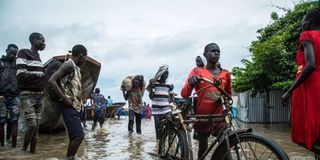South Sudan’s flood victims at risk of famine, diseases

Displaced people walk with their belongings in a flooded area after the Nile river overflowed after continuous heavy rain which caused thousands of people to be displaced in Bor, central South Sudan, on August 9, 2020.
Juba,
The victims of South Sudan’s persistent flash floods, that have devastated 80 per cent landscape of Greater Jonglei region, are appealing to the government and humanitarian agencies to rescue them from the impacts created by the downpours.
According to recent statistics from the United Nations Organisation for Humanitarian Affairs, over one million South Sudanese have been affected by flash floods across the country since June.
But data from Jonglei State Relief and Rehabilitation Commission shows that over 400,000 people have been affected by the floods.
The State authorities say the majority affected by the disaster lack shelter, food, medical supplies, and other basic essentials that can cater for their welfare.
“The major issue affecting us now is getting dry land. For example, now we are standing on water, we got no tents, everything is wet, and we have no food to eat as well.
“All the foodstuffs were submerged. Men, children and women are all affected and none can provide assistance to the other,” Martha Amuor Mach, a 60-year-old mother of two and Bor town resident, told The EastAfrican.
Makol Riak Kur, Nigel residential area secretary, said houses have been submerged.
“Imagine even latrines have been washed away. Livestock drowned and all crops were washed away. My appeal is that we need to be supported with tents, poles, and iron sheets in order to relocate.
“First, we would like to appreciate Unicef for its recent distribution of water life-straws; now people are drinking clean water and nobody has suffered from diarrhoea since,” Makol said.
Malnutrition
Atem Deng Dut, Save the Children's nutrition officer in Bor Civil Hospital, revealed that due to floods and migration, malnutrition cases have increased.
“Because the hospital is on higher grounds, many people have come here. In addition, malnutrition cases are increasing, food lacks nutrients and hygiene is poor,'' said Atem.
According to Unicef, more than 12 children have died of acute malnutrition in Jonglei State alone in the last nine months.
The charity group revealed that between January and September, it admitted 32,248 children suffering from severe malnutrition; while 63,277 others were admitted with moderate malnutrition.
The UN agency said that through 167 nutrition centres across the Greater Jonglei region, it has treated and discharged over 60,000 children for both moderate and acute malnutrition.
On the other hand, Dr Bol, Bor Civil Hospital Medical Director, said that the facility, which hosts more than 500 patients a day, has run short of essential drugs.
“Drugs supplied by Unicef, in as much as they may not be enough, are actually life saving,” Bol said.
In September alone, hospital authorities said more than seven people died of causes related to water-borne diseases.
But Akangi Peter, who works as Unicef Nutrition Field Monitor, appealed to the government to put into consideration mechanisms to tackle future problems such as famine.
“I think by next year, there is going to be severe hunger because harvests and livelihoods have been adversely affected. There is going to be a high likelihood of severe hunger and acute malnutrition,” said Peter.
Peter went on to say Unicef continues to work together with health partners at nutrition sites in carrying out immunisation to save flood victims.
Dykes
In response, Deng Gabriel, Jonglei State Relief and Rehabilitation director, said the State government is liaising with the national ministry of water and irrigation in order to see how dykes can be repaired.
“We are planning to improve the dykes in the next dry season but it will not help at the moment. It’s something that the minister announced when he came here for a visit.
Heavy downpours around South Sudan have caused havoc to many families in the past five months, forcing inhabitants to seek shelter on higher grounds.
In the troubled Greater Jonglei Region alone -- an area that is facing waves of inter-communal violence -- basic items such as sleeping materials have been submerged by water after banks of the Nile River burst.
In May, Edmund Yakani, the executive director of Community Empowerment and Progress Organisation -- a national empowerment organisation based in Juba -- appealed to the national government to quickly develop a national strategy to mitigate disasters such as floods.
According to various reports, South Sudan depends entirely on international aid organisations to address its humanitarian challenges.
The Ministry of Humanitarian Affairs and Disaster Management has often said it is unable to respond to any emergency because of lack of funds.





